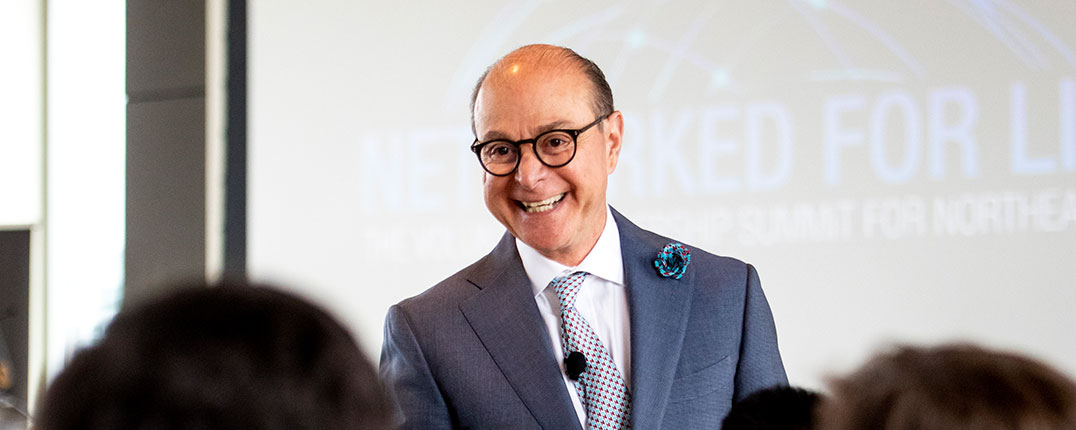To the Students of Northeastern:
This is the first communiqué in a series that I will be sending in the coming weeks addressing issues of importance to students and the entire Northeastern community. Each and every week I have conversations with students, faculty, and staff that are rich, compelling, and relevant. I encourage all of us to consider the many issues and opportunities that confront our community and society and to discuss them together as we advance our University. The shifting boundaries of what constitutes a global education is one such issue.
The World is Not Flat
The world is not nearly as flat as the media and some experts currently report it to be—a reality of critical importance for both you and the future direction of Northeastern. While it’s true that the Internet and television can make it feel like cultural divides have all but disappeared, these differences both between nations and within them are still substantial. You, the world’s future innovators, are charged with reaching beyond the limitations of technology to understand the nuances of those differences.
Globalizing our Campus
Fulfilling that charge begins at home, on our own campus. As English becomes the worldwidelingua franca in business, science, and even higher education, you will need to be able to communicate in both the cultural idioms of the United States and the English of Delhi, of Sydney, of Dublin. You will also require a firmer grasp on foreign languages. Currently, Northeastern offers courses for 13 languages (including interactive web-based support to classroom instruction) through its World Language Center, with plans to double that number in the near future. I urge you to find ways to make these classes a priority as you plan your course load; the skills you learn will be invaluable.
When seeking out ways to broaden your global perspective, also look to our vast array of on-campus multicultural events. Northeastern’s international enrollment has expanded by 70 percent over 2006-2007 alone. Many of you who have come from around the world to our University have done so because you see tremendous value in a Northeastern education. We, too, recognize the immense value you add to our community—from your perspectives in the classroom on politics, the arts, and business to your thoughts on health care and other social issues to the diverse cultural celebrations you bring to our campus life—and we know that we must create ways to integrate all of our experiences and customs. Our 19 cultural student organizations and four major cultural centers—the John D. O’Bryant African American Institute, the International Student & Scholar Institute (ISSI), the Latino/a Student Cultural Center, and the Asian-American Center—are hard at work doing just that. The programs they sponsor are not only part of campus life; they’re part of your global education.
Exporting our Passion for Experiential Learning
A true global education, of course, demands international experience beyond our Boston campus. Seek out those opportunities wherever possible. You have many options already in place through which you can obtain experience abroad—both academic and experiential—and Northeastern is actively working towards expanding upon those opportunities. I have charged Jack Greene, vice provost for experiential education, with leading that expansion. He welcomes your input during the planning and implementation process, and we both urge you to contact him with comments and suggestions (j.greene@neu.edu). What follows is a brief summary of Northeastern’s current global offerings and plans for growth in this arena:
- International Co-op. International co-op is where this University shines most distinctively in its global mission. Currently, we place students in co-op assignments in 52 cities around the globe, including the United Kingdom, Hong Kong, China, Southeast Asia, South Africa, Central and South America, and soon Australia. Identifying more of these co-op opportunities for our students—by consulting with international agencies to develop more civic engagement opportunities, for example—is among our highest priorities as a university.
- Dialogue of Civilizations. Through Dialogue of Civilizations you can combine credit-bearing study abroad with structured, meaningful contacts with other students, as well as with political leaders and community organizations in their host countries. Intensive language immersion trips are also offered. The program offers 27 trips this summer, and our Dialogue of Civilizations coordinators are always in search of new opportunities for meaningful trips.
- International Co-op Platforms. We hope for the first two of these—one in the United Kingdom, Ireland, and Scotland region and another in the Australia, Singapore, and Hong Kong region—to be in place by the end of May. These strategic interlocking partnerships, or platforms, will be formed among our own global programs—international co-op, study abroad, Dialogue of Civilizations, and service-learning—and corporate, governmental, and nonprofit agencies in specific regions. These platforms will provide richer, more cohesive international experiences for students and allow for better networking among students, alumni, and faculty abroad.
- Bachelor of Science in International Business. Through the Bachelor of Science in International Business program, you can combine six-month study periods at renowned international business schools with six-month work experiences at top-tier companies abroad, or pursue extended study-abroad programs from which they will graduate with degrees from both Northeastern and an international university. We currently partner with eight academic institutions and more than 20 companies, with ongoing efforts to build more partnerships.
These programs and others that we will create provide Northeastern students with opportunities without boundaries. They are unique and they make our University a leader in global education. This is why we say that at Northeastern, the world is your classroom. Take advantage of it.


